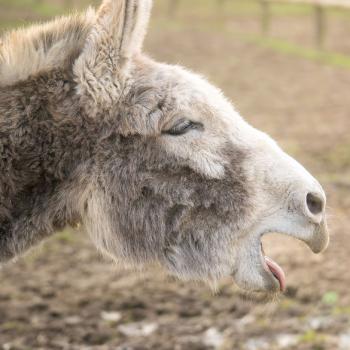With all the chaos and confusion surrounding Trump’s executive order on immigration, it is hard to get a clear sense of what the order actually does. That’s why I appreciate clarifying articles like this one from Krishnadev Calamur of the Atlantic, this one from Lyman Stone of the right-leaning Federalist, and especially this one from Damon Linker of the Week.
In his piece, Linker puts his finger on a strain of what worries me most in Trump’s presidency:
The inclusion of green card holders in the ban implies that even those who’ve been through this lengthy and rigorous screening are a threat to the nation. But if that’s true, why wouldn’t fully naturalized citizens who originated from those suspect countries also be considered a threat? When that implication is combined with the President Trump’s remarks about eventually giving preference to Christian refugees from the Middle East, what we appear to be left with is an order that lays the groundwork for something far more sweeping than a restriction on visas for foreigners from a select group of countries. We have the groundwork for treating American citizens who originated from those countries (or perhaps who just happen to be Muslim) as a uniquely threatening class of citizen — a class subject to special scrutiny, surveillance, and harassment. But of course, when a class of citizen is subject to special scrutiny, surveillance, and harassment, its members are no longer full citizens. They are second-class citizens, with more limited rights than all other, “normal” citizens.
To be clear, the executive order does not explicitly treat Muslims as inherently deserving of second-class treatment. But it can be seen as a step in that direction, a direction that Trump explicitly endorsed early in his campaign when he called for a halt on all Muslim immigration before stepping back from it, and a direction that he continued to hint at in debates when he suggested that all Muslims were responsible for knowing which other Muslims were potential terrorists.
That view, I think, is part of an even larger problem in Trump’s worldview: a willingness to punish a group for the transgressions of their associates. You can see this in his comments about “going after [terrorists’] families,” and in his willingness to endorse torture. This idea – that in some circumstances it is legitimate to punish people for their guilt by association – is toxic. Taken to its extreme, it ends up in neverending blood feuds and violence. In short: it’s from hell. And it is explicitly condemned in Scripture and in the Doctrine of the New Church:
It was of old a custom among the Gentiles, when anyone sinned, to make his companions also guilty of the offense, and even to punish a whole house for the crime of one in it. But such a law is derived from hell, where all the companions conspire together for evil. … Because they conspire together for evil, when they do evil they are all punished. But to do so in the world is wholly contrary to the Divine order; for in the world the good are consociated with the evil, because one does not know what the interiors of another are, and for the most part does not care. Wherefore the Divine law for men is that everyone shall pay the penalty of his own iniquity; as is written in Moses:
The fathers shall not die for the sons, neither shall the sons die for the fathers; everyone shall be slain in his own sin (Deut. 24:16);
and in Ezekiel:
The soul that hath sinned, it shall die, neither shall the father bear the iniquity of the son. The righteousness of the righteous shall be upon him, and the wickedness of the wicked shall be upon him (Ezek. 18:20).
(Arcana Coelestia §5764, emphasis added)
The principle is clear: it is wrong to punish a group for the sins of an associate, even if you think that most of the group is probably bad too. And I think this is the pernicious, subconscious assumption that lets people approve of things like torture: even if the person being tortured isn’t actually responsible for the crimes they’re accused of, we think, chances are they’re a pretty bad egg. And sometimes you have to break a few eggs.
Now to be fair, Trump isn’t the first to justify the harming of innocents for their guilty associations. The tolerance in the previous two administrations for drone strikes and “collateral damage” demonstrates something of the same attitude. And as Linker points out, the U.S. has a long and shameful history of “treating certain classes of people as less than full citizens (African-Americans, Native Americans, Japanese Americans).” The difference is that what in the past has merely been tolerated is in some sense championed by Trump. For example, George W. Bush felt the need to argue that waterboarding was not actually torture, implicitly acknowledging that it would be wrong to torture. Trump apparently feels no such compunction. In his words, you have to “fight fire with fire.” It’s an open endorsement of the idea that some people must suffer because of their connections to wrongdoers.
And yes, this does go both ways – both sides can be guilty of the same fault. The fact that white supremacists support Trump, for example, does not automatically mean every Trump supporter is a white supremacist, and it certainly does not justify inflicting violence on them. It’s valid to ask to what extent the actions of other Trump supporters enable white supremacists, but not to punish them for the crimes of those they are vaguely linked to. Anyone who inflicts illegal violence against another person should be prosecuted. But, that said, there’s a big difference between Trump’s actions and the actions of a few vigilante protestors. Vigilantes have the ability to inflict violence – but right now, only Trump has the power to legitimize violence as public policy. And I think he has moved in that direction.
Why has all this happened? How is it that we have allowed this principle of guilt by association to creep into our public policy? The answer, I think, is that we have made an idol out of safety and security. Security is an important thing. But justice and mercy are far more important, and when security is placed above those, injustice reigns. When Trump says, “Torture works,” the second response should be to argue that it actually doesn’t seem to very well. The first response should be to say, “It doesn’t matter if it does work – it is wrong.” For what will it profit a man if he gains the whole world, and loses his own soul?
We do need to exercise prudence and caution. The Doctrine of the New Church is explicit here:
Many people believe that love towards the neighbour consists in giving to the poor, bringing help to the needy, and doing good to everyone. But charity consists in acting prudently, and with the intention that good may come of it. If anyone gives help to a poor or needy wrongdoer, he does harm to the neighbour through him. For the help he gives strengthens him in evil and supplies him with the resources to do harm to others. (The New Jerusalem and Its Heavenly Doctrine §100)
But those decisions about the ultimate good need to be made with the recognition that some things are more important than personal safety, that some things are even worth dying for. One of these things is justice – and it is a principle of justice that the individual should bear his own sins, that no group should be punished for the misdeeds of their associates. Even if that makes us a little less safe.
Image copyright: bwf211 / 123RF Stock Photo













